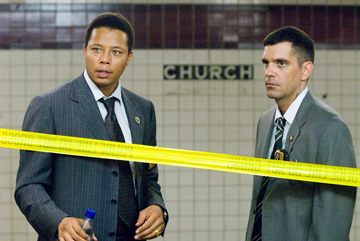So, John, I read your article and it seems that your number is up. Perhaps you’ve run out of ideas or things to write about. (In the Internet age? With all this interesting information around? Man, you must really be a dunce if telling Nicole Kidman to retire is the best story idea you can come up with.) I mean, here you are, making one of the most ridiculous arguments I think I’ve read in a while about a celebrity who, truth be told, I really don’t care all that much about. And you’ve devoted about 500 words to this and, good Christ, even collected a paycheck for this bullshit!
If only you’d retire. Because now would be the time. With all the fascinating subjects out there pertaining to film (the advantages of shooting in DV, the effects of YouTube and the efforts at control by Viacom, Hollywood people beginning to bankroll their own projects because the studios are being a bit more wary — to name just three lazy things that come to mind as I remain half-awake), this is the best thing you can come up with? Christ, you make Charlie Brooker look like fucking Updike writing about golf. Of all the mangy dogs hungering for freelancing scraps on Fleet Street, how did you of all people get this gig? Was the editor who assigned this so out of his gourd that he looked upon you, John, the rheumatic runt who nobody wanted, to write this feeble attack piece? Did you boff someone? I mean, there’s simply no rational reason I can fathom for the level of self-entitlement (why should a specific actress cater to you when there are countless others out there who you can enjoy?) and bullshit I get from your article. (If you’re going to write a rant, have a purpose, for fuck’s sake.) How long did it take for you to bang this out, Johnny? 45 minutes? (And can you even write? Isn’t “sweltering hot day” redundant? “AWOL” is capitalized, you dunce, because it’s an acronym. What kind of a lede is “It seems that rock’n’roll is no longer paying the bills for some people?” Why can’t you get your math right? You can’t be seriously suggesting that David Lean should be dethroned because Brief Encounter wasn’t prescient enough to reflect the changing sexual mores of the past sixty years, can you? You didn’t really quibble with Sean Connery’s depiction of Bond because he wore a hairpiece?)
That cultural journalism has declined so readily into this unsubstantiated claptrap and that it chooses to favor the John Pattersons of our world — bitter cranks who, in a just world, would be pumping petrol somewhere — is a sure sign that journalistic standards have fallen.





 Jordan, as I recently suggested to a friend, is the Irish Brian De Palma. He is wildly inconsistent. For every gem like Mona Lisa or The Good Thief, there’s a turd like In Dreams or High Spirits. But when Jordan is on, and he certainly is in command of his faculties in The Brave One, he offers stunning visuals, symbolism both explicit and nuanced, and the kind of cinematic experience presenting the kind of behavioral subtext reminiscent of a D.H. Lawrence story. Neil Jordan is that rarest of contemporary filmmakers: a man who presents literary tropes within an entertainment. And I suspect this is one of the reasons why The Brave One has been underappreciated.
Jordan, as I recently suggested to a friend, is the Irish Brian De Palma. He is wildly inconsistent. For every gem like Mona Lisa or The Good Thief, there’s a turd like In Dreams or High Spirits. But when Jordan is on, and he certainly is in command of his faculties in The Brave One, he offers stunning visuals, symbolism both explicit and nuanced, and the kind of cinematic experience presenting the kind of behavioral subtext reminiscent of a D.H. Lawrence story. Neil Jordan is that rarest of contemporary filmmakers: a man who presents literary tropes within an entertainment. And I suspect this is one of the reasons why The Brave One has been underappreciated.  By contrast, James Mangold is not, I suspect, a literary man, if his cheap homage to Sam Fuller (hardy har; one of the men recruited is named so) is any indication. 3:10 to Yuma has received the kind of praise suggesting that it is this decade’s answer to The Unforgiven, but I found its Western atmosphere too clean, very Hollywood, and mostly unconvincing. I pined for more dirt and blood, and even convincing makeup when a bullet is removed from Peter Fonda’s corpus. I longed for the Westerns of John Ford and Howard Hawks. Token depictions of the Chinese laborers on the transcontinental railroad are of help, as is Ben Foster’s excellent performance as Russell Crowe’s head henchmen. But Mangold would rather rip off images from Leone’s masterpiece Once Upon a Time in the West (the horsemen in the distance, the train station, et al.) and have his composer Marco Beltrami replace Morricone’s choir with synthesized nonsense. The film’s plodding first half is redeemed by a so-so gunfight near the end. But the chief problem with this film is Russell Crowe, who cannot enter a shot without mugging for the camera and seems to be under the mistaken impression that he is Henry Fonda’s Frank. The character of Ben Wade required an actor who carries both the charisma of someone who could convince his underlings to perform despicable deeds and the heartless manner of a cold-blooded villain. Crowe fails on both counts.
By contrast, James Mangold is not, I suspect, a literary man, if his cheap homage to Sam Fuller (hardy har; one of the men recruited is named so) is any indication. 3:10 to Yuma has received the kind of praise suggesting that it is this decade’s answer to The Unforgiven, but I found its Western atmosphere too clean, very Hollywood, and mostly unconvincing. I pined for more dirt and blood, and even convincing makeup when a bullet is removed from Peter Fonda’s corpus. I longed for the Westerns of John Ford and Howard Hawks. Token depictions of the Chinese laborers on the transcontinental railroad are of help, as is Ben Foster’s excellent performance as Russell Crowe’s head henchmen. But Mangold would rather rip off images from Leone’s masterpiece Once Upon a Time in the West (the horsemen in the distance, the train station, et al.) and have his composer Marco Beltrami replace Morricone’s choir with synthesized nonsense. The film’s plodding first half is redeemed by a so-so gunfight near the end. But the chief problem with this film is Russell Crowe, who cannot enter a shot without mugging for the camera and seems to be under the mistaken impression that he is Henry Fonda’s Frank. The character of Ben Wade required an actor who carries both the charisma of someone who could convince his underlings to perform despicable deeds and the heartless manner of a cold-blooded villain. Crowe fails on both counts.
 To my great surprise, there are scant YouTube links to Lois Maxwell’s fourteen Bond film appearances as Miss Moneypenny. I’m sure this will be rectified in the days to come. But really, the true Bond film fan should accept no substitute. Caroline Bliss (who copped to a decidedly non-Moneypenny Barry Manilow collection!), Samantha Bond, Barbara Bouchet, and (if you count Never Say Never Again) Pamela Salem couldn’t hold a candle to the intelligence and warmth of Lois Maxwell as Miss Moneypenny. The other Moneypennies were all bimbos by comparison. The character of Miss Moneypenny was undeniably a sexist archetype, whose flirtations were often stifled by the stern warnings of M. But somehow Maxwell brought a quiet dignity to the role, even when Bond treated her like dirt and Maxwell’s dialogue often involved pining for marriage and other now dated and desperate pronouncements. Had it been any other actress besides Maxwell, I don’t believe I would have developed a teenage crush on Miss Moneypenny, particularly the Moneypenny of the Sean Connery films. I watched all the Bond films multiple times and could never entirely understand why Bond rejected her for the floozies. But you have to understand something. I was a naive kid under the influence of Victorian literature and felt that Bond had abdicated on Moneypenny’s polite overtures to Bond. Oh, youthful naivete!
To my great surprise, there are scant YouTube links to Lois Maxwell’s fourteen Bond film appearances as Miss Moneypenny. I’m sure this will be rectified in the days to come. But really, the true Bond film fan should accept no substitute. Caroline Bliss (who copped to a decidedly non-Moneypenny Barry Manilow collection!), Samantha Bond, Barbara Bouchet, and (if you count Never Say Never Again) Pamela Salem couldn’t hold a candle to the intelligence and warmth of Lois Maxwell as Miss Moneypenny. The other Moneypennies were all bimbos by comparison. The character of Miss Moneypenny was undeniably a sexist archetype, whose flirtations were often stifled by the stern warnings of M. But somehow Maxwell brought a quiet dignity to the role, even when Bond treated her like dirt and Maxwell’s dialogue often involved pining for marriage and other now dated and desperate pronouncements. Had it been any other actress besides Maxwell, I don’t believe I would have developed a teenage crush on Miss Moneypenny, particularly the Moneypenny of the Sean Connery films. I watched all the Bond films multiple times and could never entirely understand why Bond rejected her for the floozies. But you have to understand something. I was a naive kid under the influence of Victorian literature and felt that Bond had abdicated on Moneypenny’s polite overtures to Bond. Oh, youthful naivete!